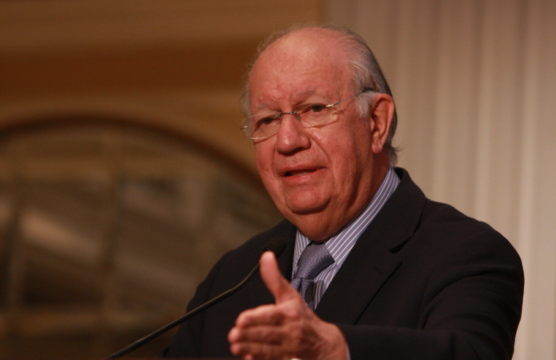
A Time for Action
Latin America inequality gap, economic integration, and infrastructure and education systems were among the issues spotlighted at the XVII Annual CAF Conference.
A Daily Publication of The Dialogue
Q: Over the next decade, there is $900 billion in planned public and private investment for infrastructure in Brazil, while other countries are also spending billions of dollars on roads, airports and other public works projects. Still, some businesses that rely on modern logistics systems say planned projects aren't enough to meet their needs. Where is the greatest demand for improved infrastructure in the region, and how well do current plans address those needs? Has money already committed on infrastructure projects been spent wisely? Does the region have adequate engineering talent and other human capital for needed projects? Can a country spend too much on infrastructure?
A: Mike Murkowski, senior vice president of operations in the Latin America & Caribbean Division at FedEx Express: "Infrastructure is vital to the growth of a country's economy. If roadways lack pavement, railroads are nonexistent and airports are underdeveloped, then businesses will be unable to capitalize on regional or global trade opportunities. Needs vary from country to country; some need to focus on developing rail networks and others on modernizing their ports. Other countries could benefit from updating their customs clearance facilities and capabilities--an important element of infrastructure with a tremendous impact on trade facilitation. The best way to overcome this deficit in the region is by combining and increasing government, private and public-private partnership investment in well-planned, long-term projects. While the region has a long way to go to be comparable to countries in Asia and Europe, some Latin American and Caribbean (LAC) countries continue to make key, strategic investments in important, long-term projects. For example, Mexico's National Infrastructure Plan will invest more than 1.3 trillion pesos (approximately $97 billion) in railway projects that will facilitate transportation and logistics, while Brazil's federal government is expected to unveil approximately $49.7 billion in planned investments for highway, railway, port, electrical and telecommunications projects this year. Latin America has the talent to invest in infrastructure development. The Heidrick & Struggles' 2015 Global Talent Index, which measures factors such as education, demographics and openness, ranked Chile (26), Argentina (32) and Mexico (36) among countries in Europe and Asia, and they have the highest ratings in the LAC region. In addition to talent, Barbados and Chile were ranked as the region's most innovative countries, 41st and 46th place respectively, in the 2014 Global Innovation Index published by Cornell University. Chile has recently established itself as a hub for entrepreneurship and innovation. These rankings show how the region is poised for strong developments in infrastructure and, consequently, for further economic growth. What is needed is the focus, commitment and public-private partnerships to make it happen."
A: Gabriel Goldschmidt, senior manager for infrastructure in Latin America and the Caribbean at the International Finance Corporation: "The critical challenge for the region lies not only in expanding infrastructure, but in 'efficient' investment particularly geared to improving its logistic competitiveness. Sometimes it involves greenfield construction, sometimes the improvement of what already exists, but the systems behind the infrastructure and the 'red tape' impediments should not be forgotten if Latin America is to fully reap the benefits of increased innovation and competitiveness. Needs are vast throughout the region, but probably transport infrastructure and services are the area with the most needs (with obvious differences among countries and among regions within countries). Another area of important needs going forward is cities. Latin America is 80 percent urban by now, expected to be 90 percent urban by 2050. Improving quality of life in cities through the provision of adequate and affordable infrastructure services has become another critical challenge. And within this challenge, transportation infrastructure and services are again at the center of what defines efficient and productive cities. The region does have adequate talent (engineering and other). It has to decide to focus its efforts and resources along a few critical areas and do so over a long period to get maximum benefits for its population."
A: Mary Rose Brusewitz, chair of the international practice at Strasburger & Price in New York: "Logistics and transportation seem to top most lists in terms of what is holding back Brazil's economic activity. The highway system is in need of expansion and improvement. The rail system is weak and in many cases nonexistent. New ports and airports and upgrades to existing assets are needed. Brazil depends heavily on hydroelectric power. Investment in alternative sources of power, including other renewable sources, could increase the stability of the energy matrix. Telephone and internet/cable systems are still unreliable. The education system needs money and other resources to support the availability of sufficient skilled engineers and workers to meet needs. Uniting public and private funds for these projects would be optimal, if the needs are appropriately prioritized and funds allocated appropriately. Corruption remains an impediment, bleeding funds from projects and discouraging new entrants. The overall health of the economy and political outlook may be discouraging domestic and foreign investors. The financing, construction, administration and management of assets must enhance transparency and accountability. Priority needs to be given to adherence to the Equator Principles or other risk management approaches, consideration of double- and triple-bottom line planning and proper dissemination of information about infrastructure projects to those potentially affected by the projects. A major drain on projects is caused by lack of attention to these concepts, resulting in costly delays, reputational damage or cancellation of projects after funds have already been spent to develop them. We need to see these concepts as part of healthy risk management, as well as moral and ethical imperatives."
Latin America inequality gap, economic integration, and infrastructure and education systems were among the issues spotlighted at the XVII Annual CAF Conference.
A Latin America Advisor Q&A featuring experts’ views on state infrastructure projects in Mexico.
 Bert Kaufmann / CC BY 2.0
Bert Kaufmann / CC BY 2.0
